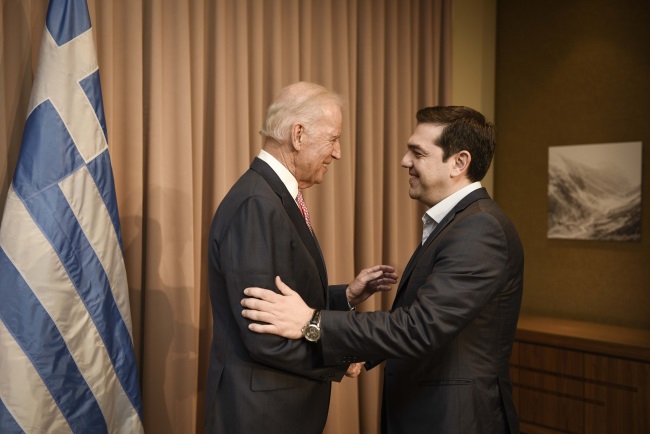It’s a high-stakes Davos visit for Greek Prime Minister Alexis Tsipras.
By Danae Leivada, HuffingtonPost
Every January since 1971, key figures in international politics, the business world and civic society have been meeting in the picturesque Swiss town of Davos to discuss major challenges facing the global community. Some people were surprised to learn that Greek Prime Minister Alexis Tsipras appeared on this year’s World Economic Forum guest list alongside invitees like UN Secretary General Ban-Ki Moon and pop star Bono.
Tsipras is the first Greek prime minister to attend Davos since 2011, when George Papandreou was there to discuss his country’s emerging debt crisis. Tsipras experienced a stellar ascent into power last year, and Greek is central to debates about Europe’s future.
This Davos visit will be a high-stakes bet for the Greek premier. Not only does he have to convince key international players involved in handling the debt crisis that his country is on the right track, he must also appeal to businessmen and get them to consider investing in Greece — despite its financial troubles.
These are the main issues on Tsipras’ plate:
The Bailout Agreement
Greece agreed to a bailout agreement over the summer, securing international funds in exchange for instituting sweeping reforms, including the restructuring of the social welfare system, cutting pension costs, privatizing a number of state assets and fighting tax evasion. Many Greek people have condemned these austerity measures, which have led to protests and strikes by groups as diverse as farmers, lawyers, doctors and seamen. Teams of experts from several European institutions are currently in Greece to assess its government’s progress in the reforms.
Tsipras plans to meet with several world leaders in Davos, including German Vice Chancellor Sigmar Gabriel and European Central Bank President Mario Draghi. The prime minister’s goal is to convince them that his government is on the right track when it comes to implementing the reforms. At the same time, he needs to speed up the European experts’ evaluation so the Greek government can resume its negotiations over debt relief and return some normalcy to the Greek economy.
In a meeting on the sidelines of the conference on Wednesday, U.S. Vice President Joe Biden told Tsipras that the U.S. will help push for a quick end to the evaluation, a source close to the talks told HuffPost Greece.
Restructuring The Debt
Tsipras is also scheduled to meet with Christine Lagarde, the head of the International Monetary Fund — one of Greece’s creditors. Tsipras and Lagarde haven’t met face-to-face since the summer’s turbulent negotiations. In Davos, they are expectedto discuss the terms and conditions under which the IMF will continue to participate in the Greek bailout program, Greece’s progress in the reforms — especially when it comes to social issues such as pensions and the restructuring of the social insurance system — and possible ways to restructure the Greek debt.
Greece has been eager to secure a debt relief from its creditors after its third bailout agreement in July, arguing that the country won’t be able to revive its economy without relief from the crippling payments. European countries participating in the agreement have been resisting writing off the debts and have said that doing so would give Greece special treatment. The IMF, however, has echoed Greece’s assessment that the country’s debt is not sustainable and should be eased.
The Schäuble Meeting
On Thursday, Tsipras is supposed to take part in a panel discussing the future of Europe. Also invited is German Finance Minister Wolfgang Schäuble, one of Greece’s fiercest adversaries during the bailout negotiations last year.
The meeting is expected to spark some fireworks. Schäuble has been known as a tough negotiator who repeatedly pressed for Greece’s exit from the eurozone and has been one of the most prominent austerity policy proponents.
The Refugee Crisis
Finally, Tsipras needs to address the refugee crisis. Hundreds of thousands of refugees and migrants have arrived on Greece’s eastern Aegean islands in the past year, overwhelming both local and national authorities. Aid agencies operating in the area have warned that refugees’ living conditions on the islands are often harsh and that the Aegean crossing from Turkey, the departure point for most refugees, has become increasingly dangerous amid winter conditions.
Tsipras planned to meet with Turkish Prime Minister Ahmet Davutoğlu, in hopes of convincing him to take effective action to stem the refugee flows, but that meeting reportedly has been canceled. Greece wants Turkey to create refugee reception centers on the Turkish coast and better patrol its beaches and waters to pick up refugee boats before they make the crossing to Greece.









